How Venezuela met Socialism? brief political history (4/5)
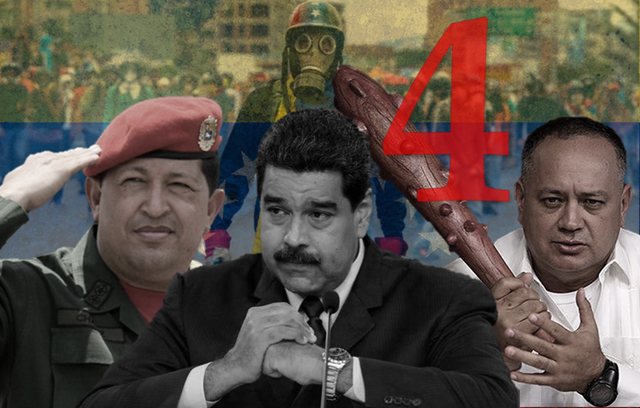
This is the Fourth part of a series consisting of 5 publications on the history of Venezuela. Currently this country is experiencing the worst crisis that Western society has known, hyperinflation, shortage of basic supplies, humanitarian crisis, violation of human rights, systematic violation of the rule of law, the highest rates of violent crime, crime, systematic corruption within institutions, indebtedness, unemployment, protests, repression, concentration of power, social division, the return of diseases that had been eradicated, malnutrition, high rates of infant mortality, cultural degradation, massive migration, in short, Venezuela suffers , in a high degree, of all social ills.
Index
1-Dictatorship of Juan Vicente Gómez, Start of the Oil Industry and Cradle of Marxism
2-Rómulo Betancourt vs Marcos Pérez Jiménez
3-Puntofijismo: Rise and Fall of the 4th Republic
4-Hugo Chávez and the Socialist Revolution of the 21st Century
5-Government of Nicolás Maduro
Hugo Chávez and the Socialist Revolution of the 21st Century

From 1958 to 1998, Venezuela's economy is maintained mainly thanks to oil revenues, something that was normal since oil was discovered and exploited on a large scale, however, in this period, the dependence on oil, the instability of its prices and poor administration of revenues, ended up ending the wealth that Venezuela had built. The crisis and dependence on this resource worsened due to a set of economic policies of regulation and control by the Venezuelan State, establish systems of price control, set minimum wages and increase union power, subsidies to different products through the granting of foreign currency at a preferential price, while rationing foreign currency to other sectors of the economy that needed it. When this situation was decided to change, looting was carried out that was repressed harshly, which led to a political crisis, and later to an institutional crisis, various coups of states, and social unrest. That was when the newly pardoned Hugo Chávez appeared on the scene, who led a coup against the government of Carlos Andrés in 1992.
Chávez is presented as a new face, away from the old ruling elite of the country, and brings with it the proposal to convene a National Constituent Assembly with the aim of reforming the Republic. This is how Chávez uses the crisis as a lever to achieve power, and wins the presidential elections of 1998, later he would convene the National Constituent Assembly:
In 1999, three consultative or electoral processes were held, the first of which was the popular consultation on the invocation of the Constituent Assembly and the norms that had been previously established. The second election took place on July 25 of the same year, where the representatives that would make up the National Constituent Assembly would be elected. Chavismo counted with 65.8% of the votes, but they obtained 95% of the representatives, this because the previously established guidelines would favor Chávez's cause in the distribution of seats. To conclude the process, after the six months granted to the Constituent Assembly to draft the new Constitution, on December 15, 1999, the constitutional proposal is submitted to a popular referendum. The new constitution was approved with 71.78% of the votes in an election in which only 44.7% of the citizens registered in the electoral roll attended, that is, it was backed by 30.40% of the the people able to vote.
After the new constitution was drafted and sanctioned in 1999, a general election was called in 2000, with the aim of relegitimizing all the powers of the State: Executive Branch (Presidency of the Republic), Legislative Branch (New Parliament Unicameral, composed of 167 deputies), Judicial Branch (Supreme Court of Justice, composed of 32 Magistrates), Electoral Power (National Electoral Council, composed of 5 rectors) and finally the Citizen Power (Represented by the Republican Moral Council, which is composed of: the Public Ministry represented by the Attorney General, the Comptroller General of the Republic, represented by the Comptroller General, and the Ombudsman, represented by the Ombudsman). In these elections Chávez ratifies his mandate and continues in charge of the presidency of the republic until 2006.
Subsequently, the Parliament would be in charge of granting Chávez an Enabling Act.
The Enabling Act is a legal tool of constitutional rank that empowers the Presidential Citizen of the Bolivarian Republic of Venezuela to issue Decrees with Rank, Value and Force of Law on the matters that he deems pertinent according to the needs and / or emergency of the country.
That is when Chávez announces the future approval of 49 laws, among which is included a new hydrocarbons law, the fishing law, and the land law that drove an agrarian reform. These three laws mainly generate discontent in the business sector of the country, represented by the Venezuelan Federation of Chambers of Commerce (FEDECÁMARAS), as well as in the Confederation of Workers of Venezuela (CTV).
FEDECÁMARAS and CTV will call a national strike, and despite being described as successful, did not achieve the goal that had been proposed, which was to make Chávez stop these laws. The lack of dialogue between the government and the businessmen caused general malaise in the business sector. The problem of entrepreneurs were mainly the following:
The reaffirmation of a statist and interventionist orientation, which would limit individual and economic liberties.
The elimination of the non-deliberative character of the Armed Forces, and the power granted to the President in the face of military promotions.
The elimination of the bicameral Congress, by a unicameral one.
The strengthening of presidentialism.
The extension of the presidential term to 6 years with the possibility of immediate re-election.
The loss of balance between the Public Powers.
A chapter of indigenous rights established in the new constitution, which was disproportionate to the Venezuelan reality.
At that time Pedro Carmona Estanga takes the presidency of FEDECÁMARAS and meets with Chávez, in the meeting, FEDECÁMARAS proposes a plan that projected to reduce unemployment and increase private participation in the national economy, but Chávez is not convinced by the proposed plan by the business sector, and responds with a proposal that had as its objective the strengthening of the State, enlarging its size and its role in the economy. So Chávez and his team continued working on the 49 laws without discussing the content with the business sector, what the latter saw as a total imposition of conditions.
Subsequently, the content of the laws is filtered, and Carmona Estanga, president of FEDECÁMARAS, has a meeting with Chávez. According to the businessman, the following dialogue occurs:
Carmona Estanga: President, a confrontation is approaching, a train crash; it must prevent the decrees laws from being approved in the way they are intended; there have not been consultations about the projects; among them the Land Law, one of the most delicate.
Chávez: I hope you do not assume the defense of the interests of the oligarchy to prevent the approval of a law that will allow the distribution of land to the poor.
Carmona Estanga: Please call a consultation, avoid a break that will be tragic.
The situation in Parliament had changed because some deputies had become dissidents, which made it unlikely that Chávez would get another Enabling Act from Parliament, it was at that time that Chávez decided to pass the laws a day before it was over his special power. This is how a lot of new laws arise, among which the most discontent caused to businessmen was the Law of Land and Agrarian Development, since this law granted the power to take private land if it exceeded a certain size, or if it considered that they were being exploited below their potential, in the same way, the State would have to approve the use that the owner of the land made with it. All owners were required to prove ownership of their land before December 18, only one month in advance, at the risk of loss them if they did not, it was estimated that 95% of the landowners did not have firm titles.
All this causes FEDECÁMARAS to suspend the dialogue with the government, and calls for a 12-hour national strike. The day of the strike FEDECÁMARAS announces that the strike was accepted by 90% of the country, but the government denies it; and proceeds to radicalize implementation of the laws. This is where the conflict erupts irreconcilably between businessmen and the government.
Until this moment, during the Chávez government, the economic situation in Venezuela is worsening. International reserves fall 10,000,000,000 dollars, Chávez cuts public spending by 22%, and then announces the devaluation of the currency by 20%. He later replaced the president of PDVSA, because he had become critical of the Hydrocarbons Law, which infuriated the company's executive payroll, because the dismissal and appointment of a new president broke a long tradition of meritocracy within the company.
During this period some resistance was shown by some high military commanders, who denounced that Chávez was trying to destroy the institutions of the Armed Forces, this causes that the political and economic crisis was added a military crisis.
Under this political, economic and institutional climate, the CTV announces a 48-hour general strike on April 9, and FEDECÁMARAS and PDVSA executives publicly decide to participate in the strike. Chavez responds to this by dismissing the oil industry managers who decided to join the strike.
It was so that on April 11, which was already the third day of strike followed, the protests turned into riots, one of the opposition marches was diverted to the Miraflores Palace, and the State media outlet, VTV, asked the government supporters go out to defend the revolution, it was then when there was a clash between the opposition march and the march of followers of Chávez, thus producing an armed confrontation between the metropolitan police, the army and different groups, which left as a result 19 dead and hundreds injured, among opponents and supporters of the government.
Given these facts, the military high command asked Chávez to resign his position, which they said he accepted. However, no evidence was ever presented that Chávez had accepted the resignation. Chávez was arrested and transferred to the Fuerte Tiuna Military Complex. Later, Pedro Carmona Estanga, until then president of FEDECÁMARAS, was self-appointed as President of the Republic.

His first official act was the dissolution of all the powers of the State, as well as the total annulment of all the laws approved by Chávez.
At dawn on April 13, Chávez is transferred to the Turiamo naval base, where he manages to write a note in which he said he had not resigned. General Raúl Isaías Baduel, who opposed the Carmona government, began actively seeking a way to restore Chávez to power, and on April 14, Chávez was released from the military prison on La Orchila Island, and is placed as president of Venezuela again.
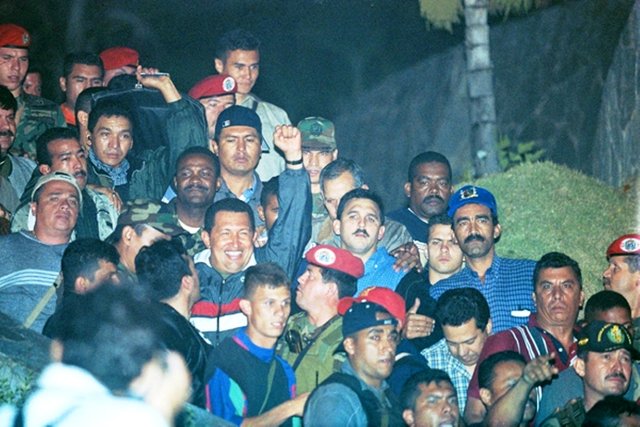
All this event that revolves around the coup d'etat, totally fractures the Venezuelan society in two camps, the supporters of Chávez and the supporters of the opposition. There is an irreconcilable conflict between the government and important sectors of society, such as the business sector, the media and opposition politicians. This is a key point in the future of the nation, because Chávez had identified all those who opposed him in an extreme way, and now he had a reason to attack them. From this arises the fundamental problem between Chávez and the United States, with the media, with the opposition politicians, as well as with various other sectors.
Later, in December of that same year, an oil strike known as "Oil strike" would take place, which would last approximately 62 days, and had the repercussions of a shortage of gasoline and other fuels, as well as food and other necessities.
The political polarization was total: it divided families and put them to fight against each other. The big shopping centers were closed, the universities suspended classes, the main local shows, such as baseball, were suspended, as were the Christmas holidays. The strike brought serious repercussions on the population. Once the gas dispensers were empty, it was common to see long queues at gas stations, which the private media constantly showed to imply that the strike was a success, which the government denied. The problem was also critical in the popular neighborhoods, where they depend on gas cylinders for cooking. It was common to see in many places in the interior of the country people cooking with firewood, old furniture and other flammable materials.
The government called former employees of the oil industry and technicians from Universities and the Armed Forces with the aim of making PDVSA work again. This was weakening the strike with the passing of days. The State decided to dismiss 15 thousand employees of PDVSA, on the grounds that they abstained from covering their jobs for a long period. Later the businessmen decided to start opening their business premises again.
All these events began to disintegrate Venezuelan society, the culprits were the Venezuelan government and the opposition, both in a confrontation that was destroying the country.
As we will see in the following chart, oil prices would start rising from 2003, until reaching 140 dollars per barrel in 2008, which translated into a strong capital inflow for the government.
This is how Chávez was able to implement his famous Missions, which consist of an extensive policy of social programs, this is basically the form of Venezuelan socialism. Education programs paid by the State, which had the objective of eradicating illiteracy, teaching reading and writing to people of legal age who did not know how to do it, as well as a basic program of secondary and university education. A medical assistance program was also implemented, which consisted of creating medical centers in the poorest areas to meet the medical needs of the people with the greatest need. A program was created to provide incentives to the "Communal Councils", a program was created to build homes that would be delivered free of charge to low-income people, a subsidized food sale program, direct subsidies to mothers, dentistry and ophthalmology. In total, 21 social programs were created focused on meeting the diverse needs of people with fewer resources, all paid by the State and thanks to the large income obtained from oil concepts.
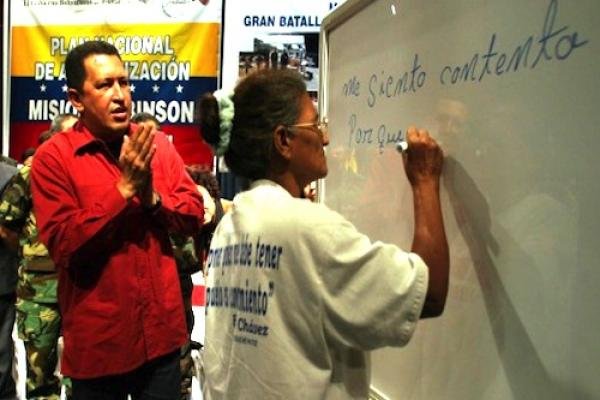
By implementing these social programs Chávez's popularity begins to increase, the poorest classes of society begin to see a little light after almost two decades with an economy that was in disrepair.
This same year, in 2003, the government implemented a series of economic measures to accompany the rise in the price of oil and the entire government project, among which stand out: price control and currency control. They do remember what happened with CONACOPRESA and RECADI in the eighties, and that I explained in Third Part, they will know that these measures are not usually very good for the economy, and that their effects are usually shortages, the closing of industries, and the subsidy of unproductive companies.
In 2004, the opposition called for a referendum with the objective of consulting the people if they wanted Chávez to continue his term of office until 2006 or if he should be dismissed, however, people ratify Chávez. Later, in the regional elections, Chávez will win 22 of the 24 governorships that exist in the country, as well as 90% of the mayorships.
During the year 2005, Chávez, authorized by the land law that he had approved years ago, begins a policy of expropriation of land to give it to those who would like to work, these measures are called as communists by all groups opposed to the government. During this same period the political, economic and social investment of the "Communal Councils" is deepened.
As you will see, in this period the government gets great popularity due to oil revenues, since it manages to solve the economic crisis, creates an extensive policy of social programs that were aimed at people with less income, expropriated land and gave it to people With fewer resources that they wanted to produce in them, Chávez confronted the opposition in the electoral field, he also confronted business groups and high-ranking military commanders, and in every case he succeeded, however, the best for Chávez is not yet It has arrived, since in the parliamentary elections of 2005, the opposition would not participate in the elections, because they denounced lack of confidence in the National Electoral Council, in such a way that Chávez managed to obtain absolutely all the seats of the Parliament.
This is a high point, because this is when Chávez totally takes over the country, from now on, he will have control of the Armed Forces, since he took measures to replace the high military commanders after the coup d'état that they made against his government, took control of the oil industry after the strike known as "Oil strike", when he fired the employees who were against him and contract ex-employees who supported the management of his government, he also took control of twenty-two governorates, of the twenty-four that exist in the country, as well as the control over 90% of the mayoralties, to put the icing on the cake, the opposition gave him completely the Parliament, with which could freely appoint the rectors of the National Electoral Council , the Magistrates of the Supreme Court of Justice, the Attorney General, the Comptroller General and the Ombudsman, in short, all the powers of the State were subordinate Attached to the central power of Commander Hugo Rafael Chávez Frías, the whole theory of the division of powers went down the toilet.

In 2006, Chávez manages to win re-election in the presidential election, so he would govern during the 2007-2013 presidential term.
In 2007, Chávez proposed a constitutional reform, with the aim of consolidating Venezuela as a Socialist State, centralizing power, giving full authority to the government to carry out expropriations, further increasing the State's participation in the economy, allowing indefinite re-election , increase the presidential periods, and institutionalize the social programs and the Communal Councils. However, despite the fact that Chávez had a lot of popular support, the initiative to reform the constitution is disapproved by the people through voting, this would be the only election Chávez lost during his political career.
It is estimated that during this period, the government of Venezuela, received about 1,000,000,000,000 dollars for oil revenues, which represents more than five times the money that had entered the nation for oil concepts during the forty years prior to his government, however, much of the money is lost in corruption and in paying for social programs. In the same way, maintaining the economy subsidized through the price control mechanism, the granting of dollars at preferential prices to various companies favored by the State with the objective of importing resources to the nation and selling them at subsidized prices, was an process expensive. In addition to buying companies such as CANTV, Electricidad de Caracas, as well as carrying out various expropriations, such as the Bank of Venezuela and several other companies. Finally it calls for a referendum with the aim of carrying out an amendment to the constitution with the aim of eliminating the number of presidential re-elections, which is approved by the people through an electoral mechanism.
Constituent Assembly, create a new constitution, get an enabling act with which he will enact 49 laws that plan to reform the Venezuelan economy and society, however, does not establish a dialogue with the various sectors of society that were involved, mainly with the business sector, which produces a conflict between both sides that ends with a failed coup, Chavez regains the presidency, and year after year his political power increases through different mechanisms, taking advantage of the mistakes made by its adversaries, in such a way that it manages to centralize power and increase its popularity due to the large capital inflows generated between 2003 and 2008, establishing an extensive program of social policies, regulates the economy and repeats the economic mistakes made in the past by politicians ers, establishing price control, regulation and control in currency exchange, and preferential exchange rates, thus subsidizing the entire economy. It diminishes the power of the industralists by means of the import of the products, and in spite of all its successes, the people refused to reform the Republic and to create definitively a Socialist State, nevertheless, later it obtained that they approved an amendment with which would make possible its indefinite reelection. During this part of his government, inequality is reduced and the quality of life of people with less resources increases, however, the middle class sees in Chavez a danger, due to the little respect for private property that he has, as well that it does not manage to control inflation, which remained one of the highest in the world, and the productivity of the country decreased more and more every day, just as dependence on oil increased.
Venezuela, like the Titanic, did not foresee the iceberg, the high oil revenues the only thing they did was to artificially maintain the economy, but if something happened with the oil industry, everything would fail, and the ship would sink.
Let's go guys! At full speed, the Socialist Revolution can not stop!
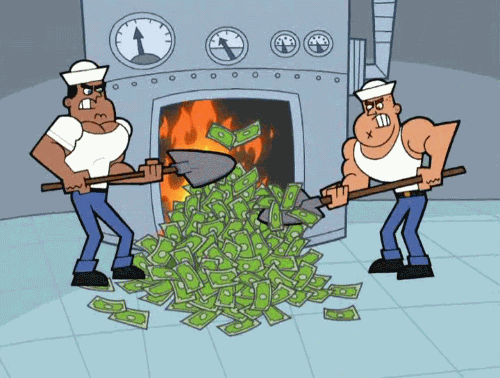


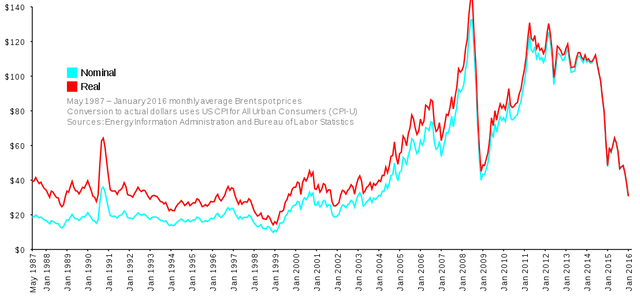
Thank you for the research here, it is important for people to know how countries can fall.
Hey, thank you very much.
It should also be mentioned that Chavez was imprisoned for the coup attempt and two years later was released by Rafael Caldera. It is also very important that you know, that education and health in Venezuela have been free of charge, even in times of prosperity.
Very good chronology, excellent.
Nice post, comrade!
Nice post
Curated for #informationwar (by @openparadigm)
Relevance:Just say no to marxism!!!!!!!!!!!!!!!!!!!!!!!!!!!!!!!!!!
@originalworks
The @OriginalWorks bot has determined this post by @vieira to be original material and upvoted it!
To call @OriginalWorks, simply reply to any post with @originalworks or !originalworks in your message!